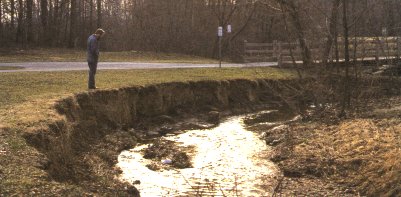Rootstown Township Stormwater Program

As stormwater flows over driveways, lawns and sidewalks, it picks up debris, chemicals, dirt and other pollutants. Stormwater can flow into a storm sewer system or directly into a lake, stream, river, wetland, or coastal water. Anything that enters a storm sewer system is discharged untreated into the waterbodies we use for swimming, fishing and providing drinking water. Polluted runoff is the nation's greatest threat to clean water.
By practicing healthy household habits, homeowners can keep common pollutants like pesticides, pet waste, grass clippings, and automotive fluids off the ground and out of stormwater. Adopt these healthy household habits and help protect lakes, streams, rivers, wetlands, and coastal waters. Remember to share the habits with your neighbors!
The Effects of Pollution
Polluted stormwater runoff can have many adverse effects on plants, fish, animals and people.
- Sediment can cloud the water and make it difficult or impossible for aquatic plants to grow. Sediment can also destroy aquatic habitats.
- Excess nutrients can cause algae blooms. When algae die, they sink to the bottom and decompose in a process that removes oxygen from the water. Fish and other aquatic organisms can't exist in water with low dissolved oxygen levels.
- Bacteria and other pathogens can wash into swimming areas and create health hazards, often making beach closures necessary.
- Debris - plastic bags, six-pack rings, bottles and cigarette butts - washed into waterbodies can choke, suffocate, or disable aquatic life like ducks, fish, turtles and birds.
- Household hazardous wastes like insecticides, pesticides, paint, solvents, used motor oil, and other auto fluids can poison aquatic life. Land animals and people can become sick or die from eating diseased fish and shellfish or ingesting polluted water.
- Polluted stormwater often affects drinking water sources. This, in turn, can affect human health and increase drinking water treatment costs.
Healthy Household Habits for Clean Water
Septic System Use and Maintenance
- Have your septic system inspected by a professional at least every 3 years, and have the septic tank pumped as necessary (usually every 3 to 5 years).
- Care for the septic system drainfield by not driving or parking vehicles on it. Plant only grass over and near the drainfield to avoid damage from roots.
- Flush responsibly. Flushing household chemicals like paint, pesticides, oil, and antifreeze can destroy the biological treatment taking place in the system. Other items, such as diapers, paper towels, and cat littler, can clog the septic system and potentially damage components.
Vehicle and Garage
- Use a commercial car wash or wash your car on a lawn or other unpaved surface to minimize the amount of dirty, soapy water flowing into the storm drain and eventually into your local waterbody.
- Check your car, boat, motorcycle and other machinery and equipment for leaks and spills. Make repairs as soon as possible. Clean up spilled fluids with an absorbent material like kitty litter or sand, and don't rinse the spills into a nearby storm drain. Remember to properly dispose of the absorbent material.
- Recycle used oil and other automotive fluids at participating service stations. Don't dump these chemicals down the storm drain or dispose of them in your trash.
Remember: Only rain down the drain!
For more information visit
www.epa.gov/npdes/stormwater
or
www.epa.gov/nps
Portage Soil & Water Conservation District
6970 SR 88, Ravenna, Ohio 44266
330-297-7633